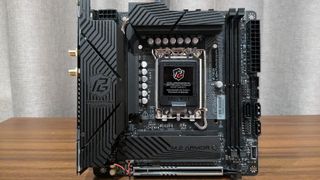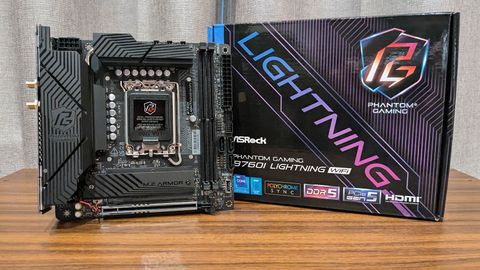Our Verdict
The ASRock B760I Lightning WiFi is a surprisingly affordable Mini-ITX option that's easily capable of joining with fastest components you wish to name. It's not loaded with connectivity options, but it's got it where it counts.
For
- Mega VRM
- Excellent memory overclocking
- Low price
- 14th Gen support out of the box
Against
- Weak USB complement
- No PCIe Gen 5 SSD support
PC Gamer's got your back
Even though the sun is setting on the LGA 1700 era, there is life in the platform yet. You'll be able to buy 14th Gen processors for a couple of years to come, and many of them will find their way into Mini-ITX systems. A board like the ASRock B760I Lightning WiFi is built to meet the requirements for a powerful, yet compact 14th Gen system. Namely, it has to have a strong VRM and support for high speed DDR5 memory. Out-of-the-box support for 14th Gen processors is a feather in the cap.
A board like the ASRock B760I Lightning WiFi is built to meet the requirements for a powerful, yet compact 14th Gen system
The B760I Lightning WiFi can be considered a second generation B760 board. It's been given some tweaks and an upgraded power delivery subsystem that's better able to handle the demands of 14th Generation Intel CPUs.
Recently, I reviewed the ASRock Z790I Lightning WiFi. While that board is a very good one, at around $279 I felt it didn't offer enough over the $185 B760I version. That's because apart from PCIe bifurcation and overclocking support, both board's specs are mostly identical, leaving few reasons to opt for the Z790I version over the B760I one. That's a good omen for the latter.
Though support for ultra-fast memory is not essential for a gaming system, it'll only become more useful as DDR5 speeds march ever-higher. The B760I Lightning supports blazing fast DDR5-8600 (OC) memory. Along with the Z790I version, it is the only board I've tested to date that allowed me to run a Teamgroup DDR5-8200 kit out of the box with just XMP enabled. That's really impressive. It supports up to 96 GB of memory, though I wouldn't be surprised to see a BIOS update that adds support for 128 GB in the future.

Socket: Intel LGA 1700
CPU compatibility: Intel 12th, 13th and 14th Gen processors
Form factor: Mini-ITX
Memory support: DDR5-8600+(OC), up to 96GB
Storage: 2x M.2, 3x SATA
USB: Up to 2x USB 10 Gbps, 7x USB 5 Gbps, 2x USB 2.0
Display: 1x HDMI 2.1, 1x DP 1.4
Networking: Realtek RTL8125BG 2.5G LAN, Intel WiFi 6E
Audio: Realtek ALC897
Price: $185 / £199
The other major highlight is its excellent VRM. It's among the very best you'll find on any Mini-ITX board, let alone a B760 one. It's a 14+1+1 phase solution with 110a stages. That's more than capable of powering an i9 14900K or KS.
The two heatsink sections are connected via a heatpipe. There is a small embedded fan but it was hardly noticeable during my testing. It really is a top class power delivery system.
As is the case with all Mini-ITX boards, the lack of PCB space means you'll have to put up with some restrictions when it comes to headers and auxiliary controllers. There are three fans headers, plus another for the VRM fan. There are two ARGB headers, plus USB 2.0 and USB 3.1 Gen (5 Gbps) headers. A 10 Gbps header would be nice to see, but USB 20 Gbps support is not really expected in this price range.





The board supports two PCIe 4.0 M.2 SSDs. One slot is located above the x16 slot, while the other heatsink-less one is located on the rear of the board. These slots are joined by three SATA ports. You'll have to look to Z790 if you must have Gen 5 SSD support, though the primary PCIe x16 slot does support Gen 5.
The B760I Lightning WiFi is a bit lacking in the rear I/O. There are welcome DP 1.4 and HDMI 2.1 ports for use with integrated Xe graphics, but the USB complement is made up of just four Gen 1 (5 Gbps) ports and two Gen 2 (10 Gbps) ports. There's no BIOS flashback support, but that's less of an issue for the B760I Lightning compared to first generation B760 boards such as the MSI MPG B760I Edge WiFi, which will likely lack native 14th Gen support unless its been shipped from the factory with an updated BIOS.
I like the inclusion of an S/PDIF port, even if the audio codec is a cheap ALC897 one. 2.5G LAN duties are provided by a Realtek RTL8125BG controller, while an Intel AX210 M.2 E-Key card gives WiFi 6E and Bluetooth 5.3 support.
System Performance
Gaming Performance
CPU: Intel Core i9 14900K
Graphics: Nvidia GeForce RTX 4090 Founders Edition
RAM: 2x 16GB G.Skill Trident Z5 DDR5-6000 C36
Storage: 2TB Kingston KC3000
Cooling: Cooler Master PL360 Flux 360mm AIO
PSU: Corsair HX1000i
As expected from a mature platform, there is little to separate LGA 1700 boards from one another in regards to performance these days. What differences there are mostly fall within a margin of error.
An important thing to note is that I used an i9 14900K and RTX 4090 GPU. The fact that this little board will happily run such a demanding CPU without a hint of an issue or a problem with VRM cooling is a real testament to the capabilities of the B760I Lightning WiFi. This is a sub $185 Mini-ITX board we're talking about.
✅You want an affordable Mini-ITX board that can accept high end components: This board can handle a 14900K and DDR5-8000+ memory with ease. Few B760 boards can make that claim.
✅ You want guaranteed 14th Gen support out of the box: B760 boards can accept 14th Gen processors, but most will require a BIOS update with an older chip. The B760 Lightning doesn't have that issue.
❌ You want lots of fast USB ports: The B760I Lightning WiFi doesn't come with 20 Gbps USB, and you only get six USB ports on the back panel.
With the B760I Lightning WiFi, ASRock has knocked it out of the park if you're after an affordable and solid foundation for a high-performance rig. It will happily handle any 12th, 13th or 14th generation CPU you wish to name. Chuck in a 14900K, plus a set of DDR5-8000+ and you'll have the foundation of a supremely fast gaming rig by any standard, let alone a Mini-ITX one.
It's not perfect though. I'd like to see a stronger USB complement. Even a pair of USB 2.0 ports on the back for a keyboard and mouse would be a significant improvement. A 20 Gbps USB port would be a cherry on top, but these weaknesses can be overlooked on a board that costs just $185.
You'll still miss out on an M.2 slot or two, four memory slots and space for expansion cards compared to an ATX board, but those are necessary sacrifices for any Mini-ITX system.
I'd honestly question the need to spend more for a Z790 Mini-ITX board unless you plan to overclock your CPU. The ASRock B760I Lightning WiFi is nearly $100 cheaper than its near identical Z790I Lighting WiFi counterpart. That's enough of a saving to put towards a better CPU or GPU, which is where real performance improvements come from.
The ASRock B760I Lightning WiFi is a surprisingly affordable Mini-ITX option that's easily capable of joining with fastest components you wish to name. It's not loaded with connectivity options, but it's got it where it counts.

Chris' gaming experiences go back to the mid-nineties when he conned his parents into buying an 'educational PC' that was conveniently overpowered to play Doom and Tie Fighter. He developed a love of extreme overclocking that destroyed his savings despite the cheaper hardware on offer via his job at a PC store. To afford more LN2 he began moonlighting as a reviewer for VR-Zone before jumping the fence to work for MSI Australia. Since then, he's gone back to journalism, enthusiastically reviewing the latest and greatest components for PC & Tech Authority, PC Powerplay and currently Australian Personal Computer magazine and PC Gamer. Chris still puts far too many hours into Borderlands 3, always striving to become a more efficient killer.
